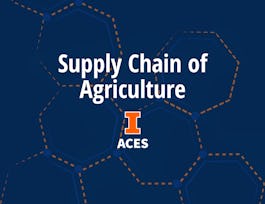Sound economic thinking is crucial for farmers because they depend on good economic decision making to survive. Governments depend on economic information to make good policy decisions on behalf of the community. This course will help you to contribute to better decision making by farmers, or by agencies servicing agriculture, and it will help you to understand why farmers respond to policies and economic opportunities in the ways they do.

New year. Big goals. Bigger savings. Unlock a year of unlimited access to learning with Coursera Plus for $199. Save now.


Agriculture, Economics and Nature

Instructor: Professor David Pannell, BSc(Agric), BEc, PhD
50,636 already enrolled
Included with 
(502 reviews)
Details to know

Add to your LinkedIn profile
7 assignments
See how employees at top companies are mastering in-demand skills


Earn a career certificate
Add this credential to your LinkedIn profile, resume, or CV
Share it on social media and in your performance review

There are 7 modules in this course
Week 1 provides a history of agricultural production and prices, an examination into the reasons behind changes in production and prices, and discussions of the 2007 global food crisis and agriculture’s usage of resources.
What's included
11 videos9 readings1 assignment
Week 2 addresses the agricultural issues of water availability, peak phosphorus, herbicide resistance, and climate change.
What's included
9 videos8 readings1 assignment
Week 3 looks at the relationship between inputs and outputs, the optimal level of an input, the question of pollution from inputs, and flat payoff functions.
What's included
9 videos4 readings1 assignment
Week 4 focuses on evaluating land conservation practices, weighing benefits and costs correctly, non-economic factors, and provides an example in conservation agriculture.
What's included
9 videos6 readings1 assignment
Week 5 discusses the importance of extending economics beyond the farm gate, characteristics of agri-environmental projects, Benefit: Cost Analysis, and provides an example with Gippsland Lakes.
What's included
8 videos7 readings1 assignment
Week 6 ties up the course through discussion of government policies that support agriculture, policies that protect the rural environment, policies with problems, and justifications for agricultural policy.
What's included
8 videos8 readings1 assignment
What's included
1 assignment
Instructor

Offered by
Recommended if you're interested in Economics

University of Illinois Urbana-Champaign

Università di Napoli Federico II

O.P. Jindal Global University

Parsons School of Design, The New School
Why people choose Coursera for their career




Learner reviews
502 reviews
- 5 stars
76.78%
- 4 stars
19.64%
- 3 stars
2.57%
- 2 stars
0.59%
- 1 star
0.39%
Showing 3 of 502
Reviewed on Jul 3, 2021
The whole course gave me economic insight of the agriculture. Also, prepared me to see the agriculture projects and products from the economic perspective's. I thoroughly enjoyed the sessions.
Reviewed on Dec 19, 2018
Interesting material, good presentation and explanations. Provided some incentive to undertake other similar MOOC's if they become available.
Reviewed on Apr 14, 2020
After completing studies in Agriculture 20+ years ago, I found this course to be a great refresher and really opened my eyes to the economics of resource management.

Open new doors with Coursera Plus
Unlimited access to 10,000+ world-class courses, hands-on projects, and job-ready certificate programs - all included in your subscription
Advance your career with an online degree
Earn a degree from world-class universities - 100% online
Join over 3,400 global companies that choose Coursera for Business
Upskill your employees to excel in the digital economy
Frequently asked questions
Access to lectures and assignments depends on your type of enrollment. If you take a course in audit mode, you will be able to see most course materials for free. To access graded assignments and to earn a Certificate, you will need to purchase the Certificate experience, during or after your audit. If you don't see the audit option:
The course may not offer an audit option. You can try a Free Trial instead, or apply for Financial Aid.
The course may offer 'Full Course, No Certificate' instead. This option lets you see all course materials, submit required assessments, and get a final grade. This also means that you will not be able to purchase a Certificate experience.
When you purchase a Certificate you get access to all course materials, including graded assignments. Upon completing the course, your electronic Certificate will be added to your Accomplishments page - from there, you can print your Certificate or add it to your LinkedIn profile. If you only want to read and view the course content, you can audit the course for free.
You will be eligible for a full refund until two weeks after your payment date, or (for courses that have just launched) until two weeks after the first session of the course begins, whichever is later. You cannot receive a refund once you’ve earned a Course Certificate, even if you complete the course within the two-week refund period. See our full refund policy.

